File Info
| Exam | Implementing a SQL Data Warehouse |
| Number | 70-767 |
| File Name | Microsoft.70-767.PrepAway.2019-07-20.68q.tqb |
| Size | 3 MB |
| Posted | Jul 20, 2019 |
| Download | Microsoft.70-767.PrepAway.2019-07-20.68q.tqb |
How to open VCEX & EXAM Files?
Files with VCEX & EXAM extensions can be opened by ProfExam Simulator.
Coupon: MASTEREXAM
With discount: 20%
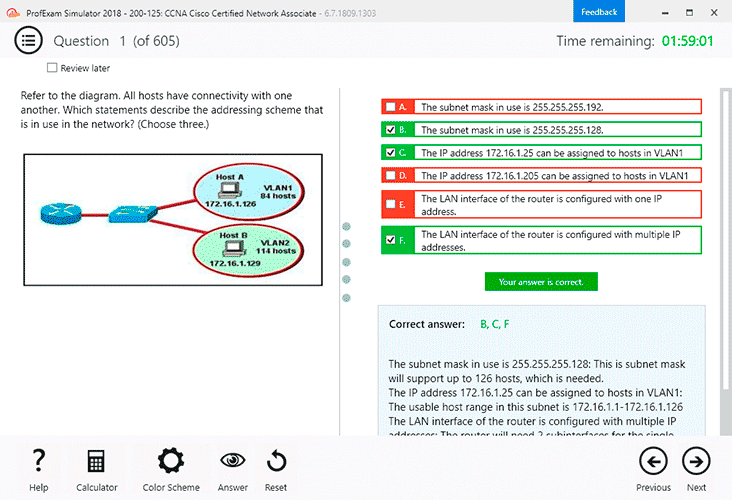
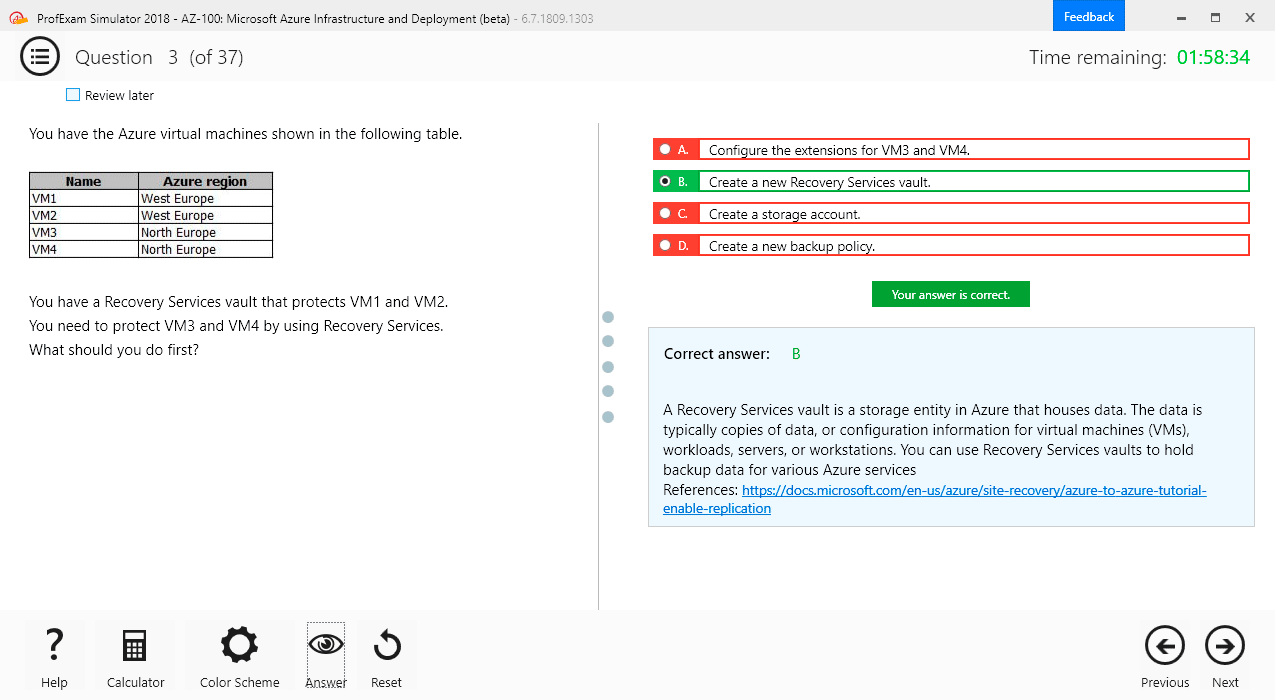
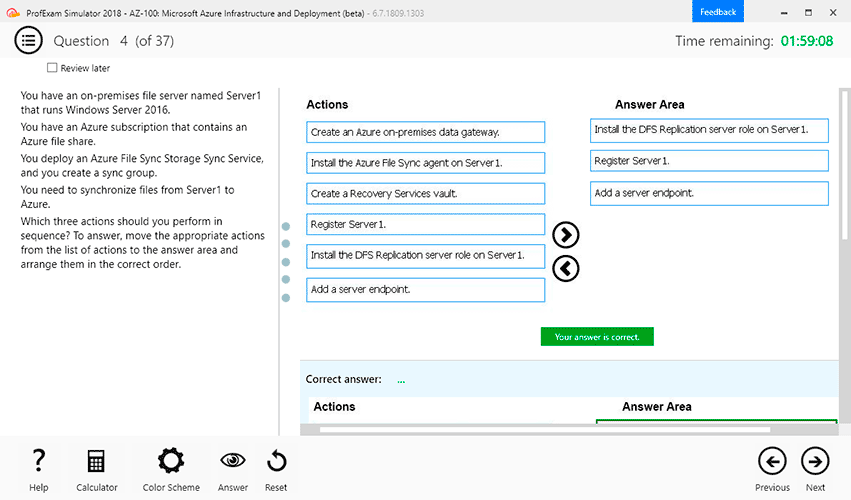
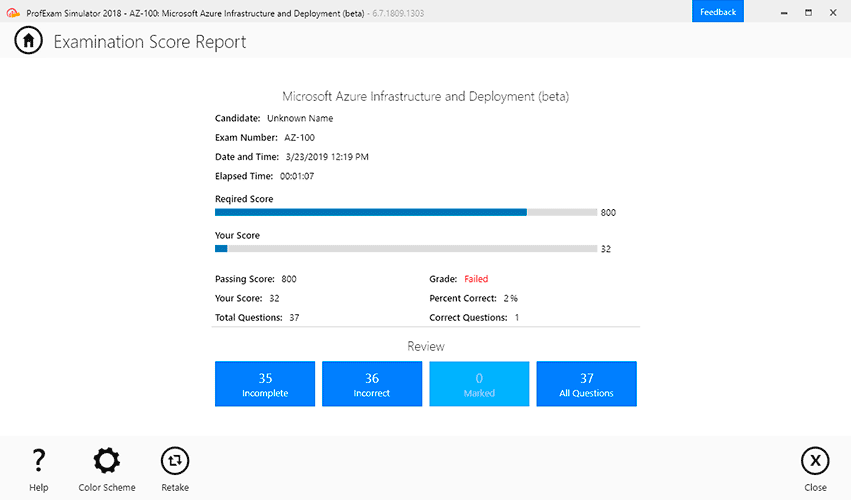
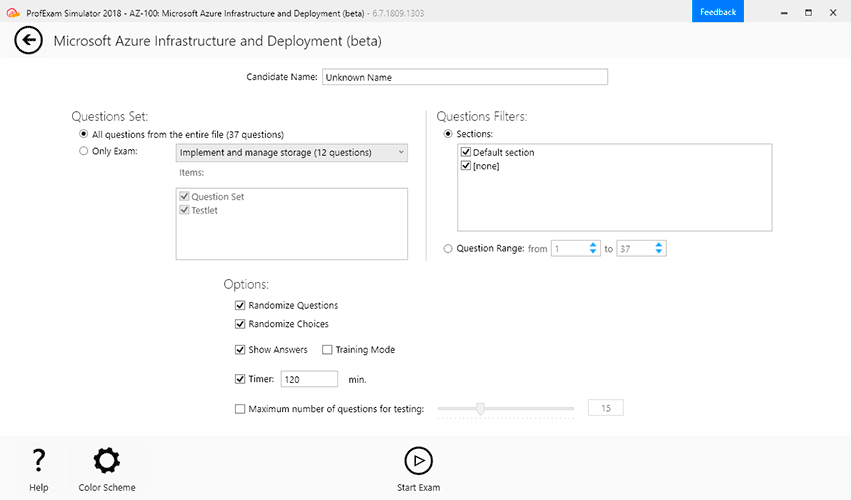
Demo Questions
Question 1


Note: This question is part of a series of questions that present the same scenario. Each question in the series contains a unique solution that might meet the stated goals. Some question sets might have more than one correct solution, while others might not have a correct solution.
After you answer a question in this section, you will NOT be able to return to it. As a result, these questions will not appear in the review screen.
You have a data warehouse that stores information about products, sales, and orders for a manufacturing company. The instance contains a database that has two tables named SalesOrderHeader and SalesOrderDetail. SalesOrderHeader has 500,000 rows and SalesOrderDetail has 3,000,000 rows.
Users report performance degradation when they run the following stored procedure:

You need to optimize performance.
Solution: You run the following Transact-SQL statement:

Does the solution meet the goal?
- Yes
- No
Correct answer: B
Explanation:
Microsoft recommend against specifying 0 PERCENT or 0 ROWS in a CREATE STATISTICS..WITH SAMPLE statement. When 0 PERCENT or ROWS is specified, the statistics object is created but does not contain statistics data. References: https://docs.microsoft.com/en-us/sql/t-sql/statements/create-statistics-transact-sql Microsoft recommend against specifying 0 PERCENT or 0 ROWS in a CREATE STATISTICS..WITH SAMPLE statement. When 0 PERCENT or ROWS is specified, the statistics object is created but does not contain statistics data.
References: https://docs.microsoft.com/en-us/sql/t-sql/statements/create-statistics-transact-sql
Question 2
Note: This question is part of a series of questions that present the same scenario. Each question in the series contains a unique solution that might meet the stated goals. Some question sets might have more than one correct solution, while others might not have a correct solution.
After you answer a question in this section, you will NOT be able to return to it. As a result, these questions will not appear in the review screen.
You have the following line-of-business solutions:
- ERP system
- Online WebStore
- Partner extranet
One or more Microsoft SQL Server instances support each solution. Each solution has its own product catalog. You have an additional server that hosts SQL Server Integration Services (SSIS) and a data warehouse. You populate the data warehouse with data from each of the line-of-business solutions. The data warehouse does not store primary key values from the individual source tables.
The database for each solution has a table named Products that stored product information. The Products table in each database uses a separate and unique key for product records. Each table shares a column named ReferenceNr between the databases. This column is used to create queries that involve more than once solution.
You need to load data from the individual solutions into the data warehouse nightly. The following requirements must be met:
- If a change is made to the ReferenceNr column in any of the sources, set the value of IsDisabled to True and create a new row in the Products table.
- If a row is deleted in any of the sources, set the value of IsDisabled to True in the data warehouse.
Solution: Perform the following actions:
- Enable the Change Tracking for the Product table in the source databases.
- Query the CHANGETABLE function from the sources for the updated rows.
- Set the IsDisabled column to True for the listed rows that have the old ReferenceNr value.
- Create a new row in the data warehouse Products table with the new ReferenceNr value.
Does the solution meet the goal?
- Yes
- No
Correct answer: B
Explanation:
We must check for deleted rows, not just updates rows. References: https://www.timmitchell.net/post/2016/01/18/getting-started-with-change-tracking-in-sql-server/ We must check for deleted rows, not just updates rows.
References: https://www.timmitchell.net/post/2016/01/18/getting-started-with-change-tracking-in-sql-server/
Question 3
Note: This question is part of a series of questions that present the same scenario. Each question in the series contains a unique solution that might meet the stated goals. Some question sets might have more than one correct solution, while others might not have a correct solution.
After you answer a question in this section, you will NOT be able to return to it. As a result, these questions will not appear in the review screen.
You have the following line-of-business solutions:
- ERP system
- Online WebStore
- Partner extranet
One or more Microsoft SQL Server instances support each solution. Each solution has its own product catalog. You have an additional server that hosts SQL Server Integration Services (SSIS) and a data warehouse. You populate the data warehouse with data from each of the line-of-business solutions. The data warehouse does not store primary key values from the individual source tables.
The database for each solution has a table named Products that stored product information. The Products table in each database uses a separate and unique key for product records. Each table shares a column named ReferenceNr between the databases. This column is used to create queries that involve more than once solution.
You need to load data from the individual solutions into the data warehouse nightly. The following requirements must be met:
- If a change is made to the ReferenceNr column in any of the sources, set the value of IsDisabled to True and create a new row in the Products table.
- If a row is deleted in any of the sources, set the value of IsDisabled to True in the data warehouse.
Solution: Perform the following actions:
- Enable the Change Tracking feature for the Products table in the three source databases.
- Query the CHANGETABLE function from the sources for the deleted rows.
- Set the IsDIsabled column to True on the data warehouse Products table for the listed rows.
Does the solution meet the goal?
- Yes
- No
Correct answer: B
Explanation:
We must check for updated rows, not just deleted rows. References: https://www.timmitchell.net/post/2016/01/18/getting-started-with-change-tracking-in-sql-server/ We must check for updated rows, not just deleted rows.
References: https://www.timmitchell.net/post/2016/01/18/getting-started-with-change-tracking-in-sql-server/

